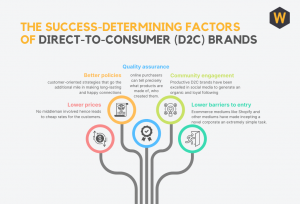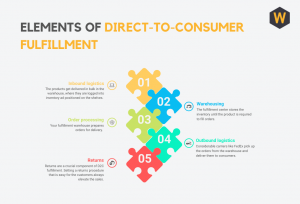Over the past some time, the direct-to-consumer (D2C) industries have attained extensive popularity due to social media, nominal prices, customer-friendly attitude, product quality, better customer interaction, etc. D2C brands are geared up for greatness with such sustained and increasing demands.
Usually, there are no layers involved in this model, and accordingly, the costs often appear to be more in-expensive than the traditional retail models. However, it is essential to thoroughly review the cost-benefit analysis to interpret the value of direct-to-consumer (D2C) services, their precise implementation, and related cost.
D2C (Direct To Consumer) – An Overview
Any sale for a product made by the company directly to consumers with its brand name without the involvement of an intermediary is recognized as direct-to-consumer sales. The overhead is relatively less, and it assists the brands with an opportunity to get linked directly with the consumers. Moreover, many businesses have established brands totally on D2C E-commerce, with products you can only purchase online.
There are many advantages of the D2C model over the traditional distribution models. The 1st is the ease of purchase and delivery, and the consumers can order the product virtually and get the same delivered as per requirement. D2C brands also have lower rates, consumer-friendly norms, and optimum-quality assurance. In contrast, we would detail the granular benefits of the D2C model in a separate blog, where we would like to document the success-determining factors of the model and how it works.
The Success-Determining Factors Of Direct-to-Consumer (D2C) Brands
-Lower prices products
Generally need to undergo manufacturers, wholesalers, distributors, warehouses, and retail dark stores in the traditional retailing scenario. Layers have their mark-ups and, as such, affect the landed cost of the product. With D2C, there is no intermediary involved, which ultimately leads to lesser rates for the customers.
-Better policies
You, as consumers, can quickly get refunds, exchanges, or repairs when you are linked with the company directly making the product. D2C companies are going the extra mile to build customer-oriented strategies to create long-lasting and happy customer connections.
-Quality assurance
On enquiring about a brand’s web portal, online purchasers can precisely know what products are made of, who created them, where they are manufactured, and what materials are considered. This conveys a sense of transparency and hence the quality of the brand/product.
conveys a sense of transparency and hence the quality of the brand/product.
-Community engagement
Productive D2C brands have worked in different channels, including social media, to generate an organic and loyal following. They frequently interact with their customers directly and turn them into brand advocates. They often create brands based on specific standards and back up charitable causes, which assists them in linking with customers on an individual level.
-Lower barriers to entry
Commencing a D2C trade has never been an easy task. However, E-commerce mediums known as Digital Market Places have tried making it a straightforward task. The brands/products need to create an account, and your business will be ready to start receiving orders. So these marketplaces act as orders generators for the brands, which many brands/products are using even their website to generate orders.
The challenging task is to move these orders through a consolidated pipeline and execute them, including picking, packing, and delivering. It becomes more complex when the order generating sources increase or the range of products for D2C service increases. And that’s where DTC Fulfilment becomes the panacea.
Direct-to-Consumer Fulfillment And How It Works?
Once received via various mediums, orders are taken in at the warehouse (WMS). The order goes straight to the fulfillment section that holds your desired products inventory. WMS generates picklists (based on orders, articles, pin-code, categories, etc.) and helps pick & pack the products. WM then schedules picking by the distribution partner (automatically via API integration), and material is dispatched.
The , though it sounds simple, success is primarily attributed to how the complex operations at the Fulfilment Centre / Micro Warehouse are eased out.
Critical Elements For Success Of D2C Fulfillment Model
D2C order fulfillment process might sound bland and straightforward. Still, there are numerous stages involved in the process that makes it a bit challenging, and addressing those ensure the success of D2C operations:
- Inbound logistics: The products get delivered in bulk in the warehouse, logged into inventory, and positioned of the shelves.

- Warehousing: Storage of SKUs / Units to pick on FIFO / FEFO etc., is efficient and automated. At the same time, inventory should have real-time visibility to the customers so that orders do not get piled up for non-availability of stock. This means that the WMS should enable a real-time updating of the catalogs in the marketplace.
- Order processing: Defining the algorithm dynamically for processing orders (based on serial order, SKUs, Warehouse Zones, product categories, Delivery Pin-codes, etc.). And this algorithm has to be efficient.
- Outbound logistics: Carrier selection mechanism to see a trade-off between speed and cost concerning orders/delivery locations etc.
- Returns: Also known as reverse logistics, returns are a crucial component of D2C ecommerce fulfillment. Setting up a returns procedure that is easy for the customers as it continually builds up customer confidence and elevates sales.
Between these above-cited steps, D2C fulfillment needs dynamic management. Your inventory planning should validate that you have adequate stock on hand to fill orders without tying up too much capital in inventory (Optimum Replenishment Planning).
Luckily, you don’t need to manage all these details. You have some ready choices for managing your D2C Fulfilment, e.g., letting a leading D2C player like WAREHOUSITY control it.
The Granular Services Offered By Warehousity.com
We, at WAREHOUSITY, assist our customers across Industries and Geographies with the best D2C experience that includes receiving & storage of products, catalog management, Order Management & processing, packing, sorting, loading, and delivery of those particular orders to your customers and returns management. Our teams are well trained to execute and manage D2C operations for you provide you with all the Technologies and Technical help to ensure the success of your brand.
Want to set up your D2C operations? Reach out to us now.
Would like to revamp your current D2C operations, Call us now!
